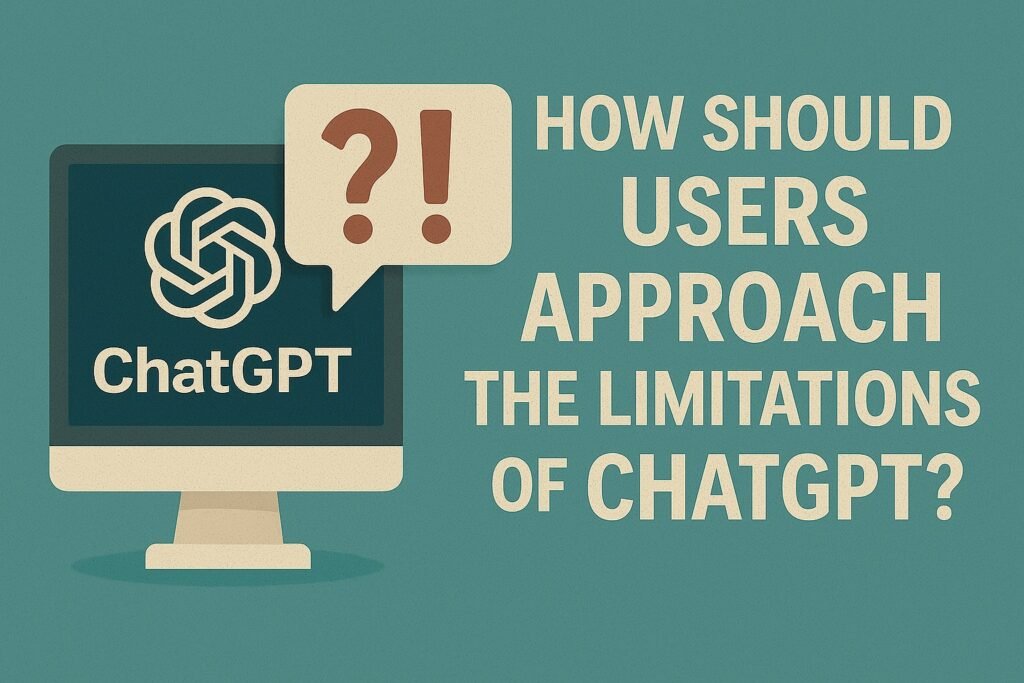While ChatGPT is a powerful AI assistant, it’s important to understand and respect the limitations of ChatGPT. Users who recognize these constraints can use the tool more effectively, avoid common pitfalls, and make more informed decisions.
In this article, we’ll explore what ChatGPT can and can’t do, and offer practical tips for approaching its limitations with awareness and responsibility.

Understanding the Limitations of ChatGPT
ChatGPT is an advanced language model developed by OpenAI, capable of generating human-like responses. However, it’s not perfect or all-knowing. Its limitations include:
1. Lack of Real-Time Data
ChatGPT’s responses are based on its training data and updates, not live internet access (unless web browsing tools are enabled).
Example: It may not know the winner of a sports game that occurred hours ago.
2. No True Understanding or Reasoning
Although ChatGPT mimics human conversation, it doesn’t “understand” concepts like a human. It predicts likely word patterns without possessing emotions, consciousness, or real insight.
3. Potential for Inaccuracies
Despite its confidence, ChatGPT can generate:
- Outdated information
- Incorrect facts
- Inaccurate citations
- Misleading answers
4. No Personal Experience or Opinions
ChatGPT doesn’t have beliefs, opinions, or personal experiences. Any perceived personality or emotion is a result of design and prompt instructions.
How Should Users Approach These Limitations?
Here are key strategies for responsible and effective use:
1. Always Verify Critical Information
Double-check any data or advice provided by ChatGPT—especially when it involves:
- Health
- Legal matters
- Finance
- News and current events
Use trusted sources such as:
2. Use It as a Co-Pilot, Not a Pilot
Think of ChatGPT as an assistant—not an authority. Let it support:
- Drafting emails or content
- Brainstorming ideas
- Summarizing information
But apply your judgment and knowledge before taking action.
🔗 Related: [AI-Powered Content Strategy Guide]
3. Provide Clear, Specific Prompts
Ambiguous input can lead to poor results. To get accurate responses:
- Include context
- Define your goals
- Ask follow-up questions
Example:
❌ “Tell me about taxes.”
✅ “Summarize U.S. federal tax brackets for 2024 in simple terms.”
4. Recognize Ethical and Bias Risks
ChatGPT may reflect biases present in its training data. Be mindful of:
- Stereotyping
- Cultural insensitivity
- Skewed perspectives
Use critical thinking and edit responses before publication or public use.
5. Know Its Limitations in Emotional Support
While it can simulate empathy, ChatGPT is not a substitute for professional help. For mental health or emotional struggles, always turn to:
- Therapists
- Counselors
- Support hotlines
When Not to Rely on ChatGPT
Avoid relying solely on ChatGPT in situations like:
- Medical diagnoses
- Legal interpretations
- Sensitive decision-making
- Real-time event updates
Instead, use it to complement expert sources.
Responsible Use Encourages Better AI Outcomes
Approaching the limitations of ChatGPT with care helps:
- Improve your interactions with AI
- Reduce misinformation spread
- Encourage ethical and safe AI practices
The more users understand the tool, the more effective and impactful it becomes.
Conclusion
The limitations of ChatGPT are not flaws—they’re reminders that AI is a tool, not a replacement for human thought. When used wisely, ChatGPT can support learning, content creation, and productivity. But it’s up to users to verify, refine, and apply the output responsibly.
Use ChatGPT with awareness, and you’ll unlock its full potential—while staying grounded in accuracy and ethics.
FAQ: Limitations of ChatGPT
Is ChatGPT always accurate?
No. ChatGPT can generate outdated or incorrect information. Always verify responses with reliable sources.
Can ChatGPT replace experts?
No. While it can support professionals, it should not replace certified experts in fields like medicine, law, or finance.
How do I avoid biased or offensive content?
Use clear, respectful prompts and review output carefully. Always fact-check before sharing or publishing.


Leave a Reply